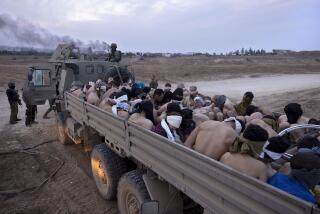Objectors in Germany Pose Medical Issue : Hospitals: Some workers threaten strike, say they would not treat evacuated American wounded.
- Share via
FRANKFURT, Germany — Opposition to the Gulf War has created a moral and medical dilemma in German hospitals to which the United States may turn for help. Some doctors are torn over their duty to treat wounded soldiers if they fill hospitals at the expense of German civilians, and conscientious objectors in some hospitals are threatening to strike.
The conscientious objectors, who held a nationwide “warning strike” Thursday, insist they are not opposed to helping Americans in need. Instead, they say they are protesting being forced to take part in anything that supports the making of war.
Their position was criticized this week by more conservative quarters and physicians who believe they have an obligation to help, some of whom suggested that the rancor within hospitals could spark a new wave of Germany-bashing in the international press.
“What kind of people are they who work in a hospital . . . and demand some kind of political certification before they treat the injured?” wrote the editor of the country’s conservative daily, Bild Zeitung. “. . . What kind of country is it that even allows such craziness to enter the discussion?”
It is unclear how involved German hospitals might be asked to become in the care of soldiers injured in the war. If U.S. military hospitals in Germany become filled, or have complex cases they cannot handle, they are expected to turn to the Germans for help.
An estimated 10% of the nurses’ aides and support workers in German hospitals are conscientious objectors doing time in social instead of military service. One in every 10 German men drafted for military duty is said to be a conscientious objector.
“The issue is that to make a war, many parts have to do their jobs,” said Klemens Bohm, a 32-year-old war resister in Frankfurt. “. . . We do not want to be a little wheel in the whole machine, to make this war that (someone else) has begun.”
On Thursday, activists said about 4,000 conscientious objectors in 40 cities and towns, approximately 20% of the objectors working in hospitals, briefly walked off their jobs to publicize their position. They arranged for other workers to cover their duties on an emergency basis so no patients would be left unattended.
Many conscientious objectors are not certain what they would do if they were actually confronted with a wounded U.S. soldier. They say that decision would be up to the individual, though many of them, and others, believe they would not refuse to help a person in need.
“I think the moment casualties are here, they will change their minds (about refusing help),” said Margarethe Nimsch, director of the Frankfurt Health Department. “These are very serious people. They would not allow harm to come to patients.”
Four U.S. military hospitals in Germany will be the primary recipients of Gulf War casualties, but they have fewer than 1,000 beds in peacetime. All four have expanded in recent weeks, although the military refuses to disclose their wartime capacity.
Even during peacetime, U.S. military patients needing some specialized care, such as neurosurgery, are referred to German hospitals. Since the war began, military hospitals have stopped taking patients and are referring most urgent cases to German hospitals.
But Germany, like the United States, has a serious shortage of nurses, which has forced hospitals to close down beds in areas like intensive care. In the Frankfurt area, the shortage has forced the reduction of as many as 10% of all hospital beds, Nimsch estimated.
Nimsch and others said they believe most doctors and hospitals are nevertheless willing to try to accommodate wounded U.S. soldiers. But a few physicians, most of them critics of the war, predict the injured would fill scarce beds, forcing hospitals to turn away German patients.
“Doctors are divided. It’s an ethical conflict, to have to send someone away,” said Dr. Winfried Beck, a Frankfurt orthopedic surgeon. “. . . Officials here should be honest and say if we take part in this war, there will be victims in our population.”
Meanwhile, members of Germany’s well-established community of conscientious objectors say they have targeted hospitals they believe have made agreements with the U.S. military. They say treating injured soldiers is essential to war, and often the patients later return to battle.
“We are conscientious objectors--not only to carrying weapons but to anything that has to do with the military or supporting or preparing for war,” said Matthias Kittmann, an organizer of the protest. “We don’t refuse to help people. We refuse the use of force to make us do that.”
Conscientious objectors are required by law to spend 15 months in social service in return for exemption from the mandatory one year of military duty. Most work in hospitals or in programs for the elderly or disabled. Some argue that other alternatives, such as peace work, should be allowed.
“Once soldiers are in the hospitals, that’s an individual decision,” said Kittmann. “We are saying, now, we don’t support these hospitals. Once we are faced with (wounded soldiers) we can’t say we won’t help.”
More to Read
Sign up for Essential California
The most important California stories and recommendations in your inbox every morning.
You may occasionally receive promotional content from the Los Angeles Times.










